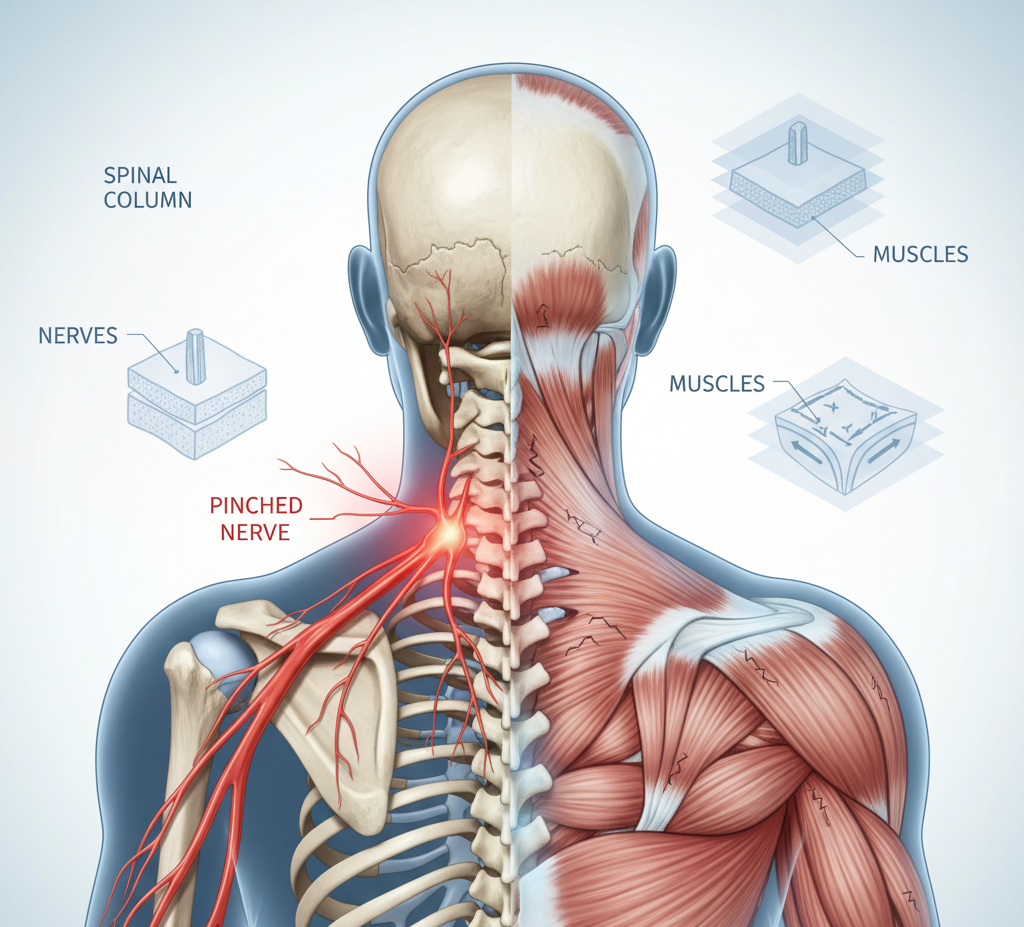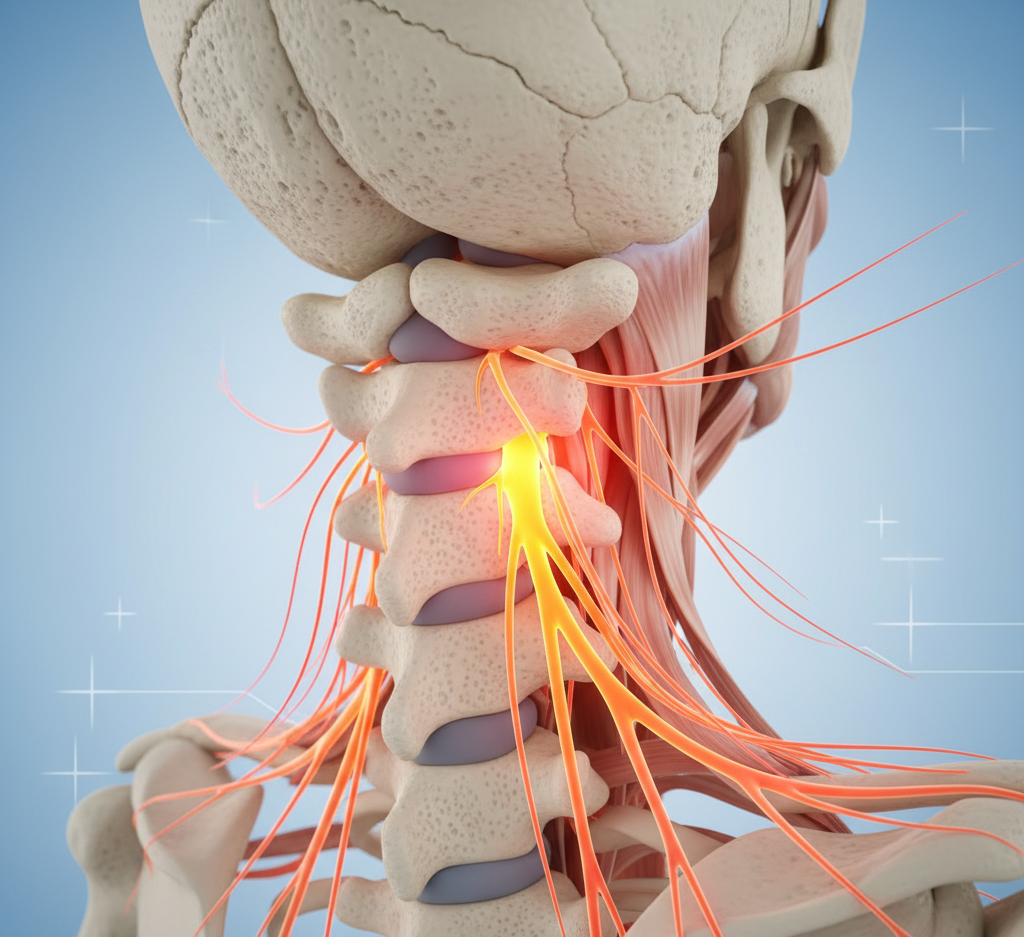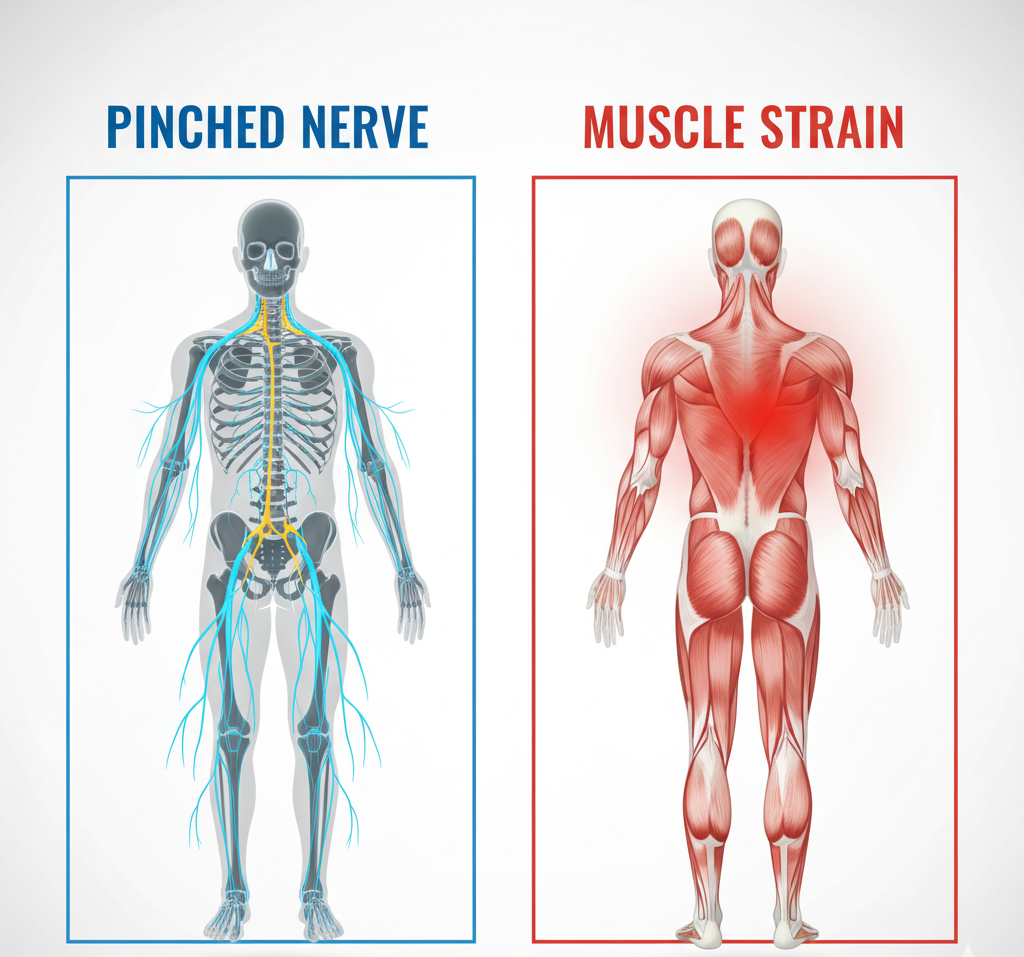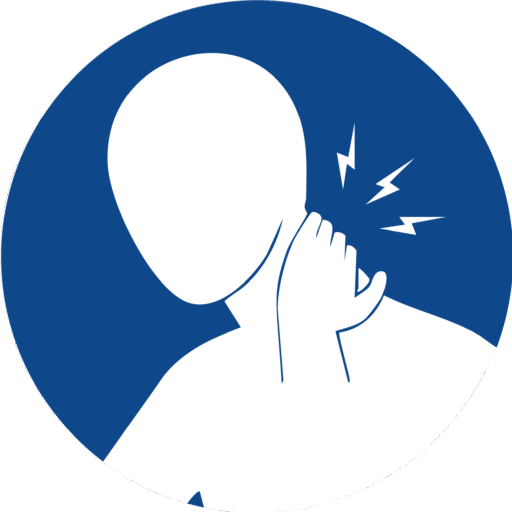The back, neck or limb pain could have different causes. A pinched nerve and a muscle strain are considered to be two of the most prevalent. Although the two may be painful and limiting, the kind of pain, pattern and the way your body responds is entirely different. To be treated and cured faster, it is necessary to know what type you have.

This Guide will Explain:
- What each condition means
- Identification of the difference.
- Common causes and symptoms
- Preventive measures and the treatment.
What Is a Pinched Nerve?
Pinched nerve is a narrowing or constriction of a nerve that has been crowded or annoyed by its immediate surroundings that consists of bones, muscles or discs. Such pressure disrupts nerve impulses, which cause pain, numbness, tingling or muscle weakness in this area.

The Pinched Nerves Take Place in:
The neck that results in pain or numbness that travels to shoulders and arms.The lower back, which may result in the pain in the downward direction of the legs (sciatica).
Either the wrist or elbow which causes carpal tunnel and ulnar nerve compression. The most important feature is the fact that the pain spreads along the nerve path, it is often sharp, burning, or even tingling.

What Is a Muscle Strain?
Pulled muscle, also known as muscle strain, occurs when the muscles are stretched too far or destroyed by rupturing their tendons or linking them to the bones. This is normally brought about by a lifting something that is too heavy, twisting suddenly, over working, or due to lack of proper warm up before the exercise.
The discomfort of a strain is local–you do not really feel it, you only feel it in the muscle itself or in some little surrounding. The area could also be sore, tender or swollen and painful when moved or pressed.
How to Know which one you have.
Ask Yourself:
- Was the Pain Shooting or Down The Arm or Leg? Likely a Pinched Nerve
- Is the pain in one muscle and painful to touch? Likely a muscle strain
- Is it numb or tingling, or burning? Likely a pinched nerve
- Is the pain onset Following The Lifting or Overexertion of a Muscle? – Likely a Muscle Strain
Diagnosis by a Doctor
- In order to prove the difference a doctor may:
- Take a history on your symptoms and activity.
- Do Physical Examination, including Muscle Strength, Reflexes and Sensation.
- Request imaging of Nerves e.g. MRI or X-ray to Detect Nerve Compression.
- Nerve conduction tests (EMG) are used to assess nerve function in case symptoms do not disappear.
A Strains in Muscle Treatment.
Rest: There should be no heavy lifting and abrupt movements.
Ice: Use ice during the first 15-20 minutes of the initial 48 hours.
Heat: Once the swelling subsides, use light heat in order to loosen the muscle.
Stretching: Gentle slow stretches help to regain the flexibility.
Analgesics: OTC drugs such as ibuprofen or acetaminophen should be used.
Physical Therapy: A therapist would help you in exercises of strengthening and recovery.
Majority of mild muscle injuries are healed in 1 to 3 weeks when they are taken care of.

Pinched Nerve: Treatment.
Rest and Adjustment of Poses: Do not put the pain in exasperated positions.
Cold and Heat Therapies: Use of alternate ice and warm compress to decrease inflammation.
Physical Therapy: Light exercises will assist in increasing the posture and reducing the nerve pressure
Medication: Have anti-inflammatory or nerve pain medicine, as ordered
Nerve Decompression: There are certain cases whereby the spinal traction or decompression therapy is applied to minimize the nerve compression.
Injections or Surgery: Cases that are severe may require corticosteroid injections or a minor surgery to decongest.
The recovery of pinched nerves is dependent on the severity, though they do not take long (usually a couple of weeks) to recover with regular treatment.
When to See a Doctor
- Go to a doctor Expected to visit immediately in case you have the following symptoms:
- It may result in numbness or weakness in your arms or legs.
- Pain has been present over a period of one week with no improvement.
- Balance or co-ordination loss.
- Bladder and bowel loss of control.
- Extreme pain following the fall or trauma.

Prevention Tips
- Have a Proper Posture During Sitting, Standing or Working On a Desk.
- Have frequent rest-periods in long working hours.
- Warm up before working out and carry the things safely.Training Back and core muscles to
- support the spine.Be hydrated and keep your weight down.
Summary
Although a pinched nerve and a muscle strain are similar in terms of the pain and discomfort, they still have some differences in terms of their impact on your body:
Pinched nerve: It is characterized by a nerve being compressed, and the result is radiating, tingling or burning pain.
Muscle strain: It is a process that entails overstretching or tearing of muscle fibers to result in soreness and stiffness of a single part.
This identification will make you select the appropriate treatment rest and ice in case of a muscle strain, or nerve block and posture adjustment in case of a pinched nerve.The sooner an individual receives the attention and takes proper self-care, the sooner the recovery will be more rapid, painful and occurrence prevention.
